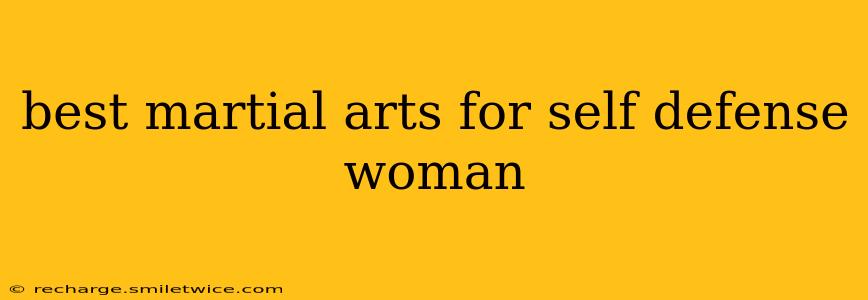Choosing a martial art for self-defense is a deeply personal decision, depending on individual preferences, physical attributes, and learning styles. However, certain arts consistently prove more effective for women seeking self-defense skills. This guide explores some of the best options, addressing common questions and concerns.
What are the most effective martial arts for women's self-defense?
Several martial arts stand out for their effectiveness in self-defense situations for women. These styles prioritize practical techniques, realistic scenarios, and empower individuals to defend themselves effectively against larger, stronger opponents. Top contenders include:
-
Krav Maga: Developed by the Israeli military, Krav Maga focuses on real-world self-defense techniques. It emphasizes simple, brutal, and effective moves that can be used against multiple attackers. It doesn't rely on strength or size, making it ideal for women. The focus is on quickly neutralizing threats.
-
Judo: This Japanese martial art focuses on grappling, throws, and joint locks. It's highly effective in controlling an opponent and bringing them down, regardless of size or strength differences. Judo's emphasis on leverage and technique makes it a powerful self-defense tool for women.
-
Brazilian Jiu-Jitsu (BJJ): BJJ concentrates on ground fighting and submissions, focusing on controlling an opponent's body from the ground. This is particularly valuable in self-defense because it allows a smaller, weaker person to effectively neutralize a stronger attacker. It's excellent for learning how to defend against being taken to the ground.
-
Muay Thai: Known as the "art of eight limbs," Muay Thai utilizes punches, kicks, elbows, and knees, making it a highly effective striking art. Learning effective striking is vital for self-defense, enabling a woman to create space and deliver impactful strikes.
-
Wing Chun: A very close-range fighting style, Wing Chun emphasizes efficiency and speed, utilizing simultaneous attacks and defenses. Its focus on structure and power generation allows women to effectively defend against larger attackers despite size differences.
What martial art is easiest for women to learn?
The "easiest" martial art is subjective and depends on individual learning styles and physical capabilities. However, some styles are generally considered more accessible for beginners:
-
Krav Maga: Its emphasis on simple, straightforward techniques makes it relatively easy to learn the basics quickly.
-
Aikido: While requiring dedication, Aikido's focus on using an opponent's momentum against them can be effective even for those with less strength. However, it may be less practical in highly aggressive scenarios.
Ultimately, the ease of learning depends more on the quality of instruction and individual commitment than the inherent complexity of the style.
Is self-defense training necessary for women?
While not everyone needs martial arts training, self-defense training offers invaluable benefits for women, enhancing their confidence, situational awareness, and ability to protect themselves in potentially dangerous situations. It's about empowerment and preparedness, not necessarily becoming a fighter.
What are some self-defense tips for women?
Beyond martial arts, effective self-defense involves more than just physical techniques:
-
Situational awareness: Pay attention to your surroundings and avoid risky situations whenever possible.
-
Confidence: Projecting confidence can deter potential attackers.
-
Vocalization: Yelling loudly to attract attention can be highly effective.
-
Escape strategies: Learn how to quickly escape from grabs and holds.
Which martial art is best for smaller women?
Martial arts that leverage technique over raw strength are ideal for smaller women. BJJ, Judo, and Krav Maga are excellent choices because they emphasize skill and leverage rather than brute force. These styles teach effective ways to control and neutralize larger opponents.
Is it possible to learn self-defense effectively without formal training?
While some basic self-defense techniques can be learned from online resources, formal training is crucial for effective self-defense. A qualified instructor provides personalized guidance, feedback, and helps develop crucial reflexes and instincts that can't be learned passively. Formal training also provides a safe environment to practice techniques and build confidence.
Choosing the right martial art for self-defense is a personal journey. Consider trying introductory classes in different styles to find one that suits your personality, learning style, and fitness level. Remember, consistency and dedication are key to developing effective self-defense skills.
